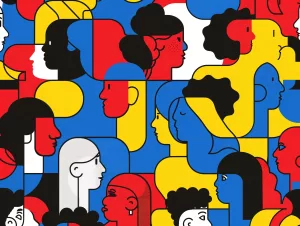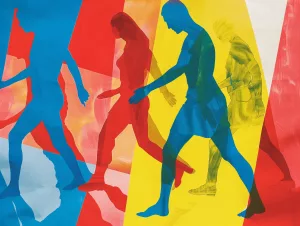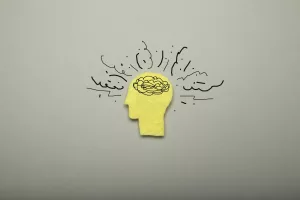Table of Contents
Introduction to the Foundations of Human Behavior
When we talk about “behavior,” we’re referring to the way individuals act and react in various situations, influenced by internal and external factors that range from biological systems to cultural norms. This complex tapestry of actions encompasses everything from automatic physiological responses to deliberate, conscious choices. Understanding human behavior is like peeling back the layers of an onion—each layer offers a deeper insight into the myriad forces that drive our every action.
Human behavior is a result of the interplay between three fundamental components: biological, psychological, and sociocultural factors. These elements are not isolated; they interact dynamically to shape the way we perceive the world and respond to it. Let’s explore how these foundational aspects of behavior provide a framework for understanding the complex nature of human actions.
Biological factors include our genetics, brain chemistry, and physiology. They are the scaffolding of our behavior, setting the boundaries of our potential and our predispositions. For instance, our genetic makeup can predispose us to certain traits and behaviors, such as shyness or extraversion, while our brain chemistry can influence how we process emotions and react to stress.
Psychological factors delve into the cognitive and emotional aspects of behavior. This includes how we think, what we feel, and the past experiences that shape our perceptions and actions. Cognitive processes like perception, memory, and decision-making dictate how we interpret and respond to different situations. Emotions can drive us to act irrationally or motivate us to overcome seemingly insurmountable obstacles. Moreover, our personality traits guide our consistent patterns of feeling, thought, and behavior.
Sociocultural factors reflect the impact of the social and cultural environments on our behavior. This includes the influence of family, friends, social networks, cultural norms, and societal expectations. These factors shape our behavior through learned behaviors, social roles, and the norms that dictate acceptable behavior within a society. For example, culture can influence how we express emotions, what we value as important, or how we view authority.
Each of these components offers a unique lens through which to view human behavior, but it is their intersection that truly illuminates why we act the way we do. By understanding these foundational influences, we can better comprehend not only individual differences but also the commonalities that bind us as humans. This knowledge is crucial not just for academic or professional pursuits, but for enhancing our everyday interactions and the quality of our lives. As we continue to explore these foundations in the following sections, keep in mind the complexity and interconnectedness of the factors that shape our behaviors.
Biological Basis of Behavior
The biological basis of human behavior is rooted in the complex interplay of genetics, brain chemistry, and physiology. Each aspect contributes to the unique patterns of thought, emotion, and action that characterize an individual. Understanding these biological factors provides a foundational understanding of why we behave the way we do.
Genetics and Behavior
Genetics play a crucial role in shaping behaviors by influencing our predispositions towards certain traits and abilities. For instance, twin studies have revealed that traits such as intelligence, aggression, and risk of mental health disorders have a genetic component. A landmark study by Bouchard et al. [1] demonstrated that identical twins reared apart exhibit remarkably similar behaviors, suggesting a strong genetic influence.
Neurobiology of Behavior
At the heart of our behavior is our brain, which acts as the control center, processing and responding to information. Neurotransmitters, the chemical messengers in the brain, play a pivotal role in this process. For example, serotonin and dopamine influence mood and motivation respectively. Alterations in these chemicals can lead to behavioral changes, which are central to conditions such as depression and schizophrenia [2].
Hormonal Influences
Hormones also significantly impact behavior. The endocrine system, which secretes hormones into the bloodstream, interacts closely with the brain to affect a wide range of behaviors from stress response to social bonding. The hormone oxytocin, often dubbed the “love hormone,” for example, is involved in forming social bonds and trust. Research by Kosfeld et al. [3] showed that inhaling oxytocin increases trust among people, highlighting its role in social behavior.
The Brain’s Structure and Function
The structure and function of the brain also dictate behavioral outputs. Different brain regions have specialized functions that influence specific behaviors. The amygdala, involved in emotional processing, and the frontal cortex, responsible for decision-making and problem-solving, are two critical areas. Structural differences in these areas can lead to distinct behavioral patterns. For instance, individuals with a larger amygdala may experience heightened emotional responses [4].
Environmental Interactions
While biological factors provide the groundwork for behavior, it is essential to note that they do not operate in isolation. The environment interacts with biological predispositions in a process known as gene-environment interaction. This concept is crucial in understanding behaviors that are not solely dictated by genetic makeup but are influenced by environmental factors throughout life.
In conclusion, the biological basis of behavior is an intricate tapestry woven from genetic, neurobiological, and hormonal threads, each playing a critical role in shaping how we act and react. This foundation underscores the importance of considering biology when examining human behavior, providing insights that are crucial for both scientific understanding and practical applications in medicine, psychology, and education.
Psychological Factors
Psychological factors encompass the vast array of internal processes and characteristics that influence behavior, including cognitive functions, emotions, and personality traits. These elements form the psychological framework that dictates how we perceive and react to the world around us.
Cognitive Processes
Cognitive processes such as perception, memory, attention, and decision-making play critical roles in shaping our behavior. Our perceptions influence how we interpret and interact with our environment, while our memories store and retrieve information that guides our actions and decisions. Decision-making, often influenced by cognitive biases, can significantly affect our behavior in complex and sometimes unexpected ways. Kahneman and Tversky’s work on cognitive biases and heuristics, such as the availability heuristic and confirmation bias, demonstrates how these mental shortcuts often lead to errors in judgment that impact behavior [5].
Emotional Influences
Emotions are powerful drivers of behavior. They can override rational thought, motivate us to take action, and influence our decisions and interactions. The James-Lange theory of emotion suggests that physiological arousal precedes the experience of emotion, and this emotional response can significantly affect our behavior [6]. For example, fear can lead to avoidance behavior, while joy might encourage social interaction.
Personality Traits
Personality traits are relatively stable characteristics that influence consistent patterns of behavior. The Big Five personality traits—openness, conscientiousness, extraversion, agreeableness, and neuroticism—provide a framework for understanding these patterns. Research has shown that these traits can predict various behaviors, such as job performance, academic success, and interpersonal relationships [7]. For instance, highly conscientious individuals tend to display a higher level of discipline and a preference for planned rather than spontaneous behavior.
Psychological Development
The development of psychological traits over time also plays a crucial role in shaping behavior. Developmental psychology examines how individuals change over their lifespans, from infancy through adulthood. Erikson’s stages of psychosocial development, for example, outline how personal and social functioning evolves and how conflicts at various stages can influence future behavior [8].
Influence of Mental Health
Mental health significantly impacts how we behave, think, and feel. Psychological disorders such as anxiety, depression, and bipolar disorder can dramatically alter an individual’s behavior. Cognitive behavioral therapy (CBT) has been particularly effective in modifying behaviors by changing thought patterns, demonstrating the interplay between cognitive processes and behavior [9].
In conclusion, psychological factors are integral in shaping human behavior. They provide insight into why individuals act in certain ways and how they might react to various situations. Understanding these factors is essential for fields ranging from education and psychology to marketing and management, where tailoring approaches to these psychological dimensions can significantly influence outcomes.
Sociocultural Influences
Sociocultural influences encompass the effects of societal norms, cultural values, and social contexts on human behavior. These factors play a crucial role in shaping individual behaviors by defining acceptable norms, influencing personal values, and providing the social framework within which we operate.
Cultural Norms and Values
Culture profoundly impacts behavior through its norms and values, which dictate what is considered acceptable or taboo in a society. These norms can influence everything from the language we use to how we celebrate significant life events. Hofstede’s cultural dimensions theory illustrates how cultural values can affect behavior, such as individualism versus collectivism impacting group dynamics and social interactions [10]. In individualistic societies, personal achievement and independence are valued, while collectivist cultures emphasize family and community interdependence.
Socialization and Role Expectations
From birth, individuals are socialized into their cultures, learning the behaviors and expectations of their society. Socialization agents, including families, schools, religious institutions, and media, all contribute to this process. For example, gender roles, deeply ingrained in most cultures, dictate specific behaviors and responsibilities for men and women, which can influence career choices, family responsibilities, and personal aspirations. Research by Eagly and Wood suggests that social role theory explains much of the variance in gender behavior across cultures [11].
Social Structures and Hierarchies
Social structures and hierarchies also shape behavior by defining power relations within a society. Class, race, and gender can affect access to resources, opportunities, and privileges, which in turn influence behaviors. Pierre Bourdieu’s concept of social capital illustrates how individuals in higher social strata gain more opportunities to accumulate wealth and status, affecting behavior across generations [12].
The Role of Language
Language is not only a means of communication but also a cultural tool that shapes our perceptions and interactions. The Sapir-Whorf hypothesis, for instance, posits that the structure of a language influences its speakers’ worldview and behavior [13]. Language can shape our perceptions of time, space, and even the distinctions between colors, influencing how we think and act.
Cultural Adaptation and Change
In a globalized world, the interaction between different cultures can lead to cultural adaptation and change, influencing behaviors. As individuals migrate or are exposed to multiple cultures, they may adopt new behaviors and discard others. This blending of cultures can lead to hybrid identities, where individuals combine elements of multiple cultural backgrounds into their behavior.
In conclusion, sociocultural influences are a powerful force in shaping human behavior. They provide the context within which individuals develop, adapt, and interact. Understanding these influences is crucial for comprehending how behaviors are formed and transformed across different societies and how these behaviors reflect broader social patterns and challenges.
Conclusion
Understanding the foundations of human behavior—biological, psychological, and sociocultural—is essential for grasping the complexities of why we act the way we do. Each dimension offers unique insights that illuminate the various forces shaping our actions and reactions. By examining these foundational aspects, we can better appreciate the diversity of human behavior as well as the commonalities that connect us.
The knowledge of these fundamental influences is invaluable not only for academic and professional pursuits but also for everyday interactions. It equips us to better understand ourselves and others, fostering empathy and improving our ability to navigate the social world effectively. As we continue to explore and understand these foundations, we open doors to enhanced interpersonal relationships and more effective solutions to social issues.
By acknowledging and integrating these diverse influences, we move towards a more comprehensive understanding of human nature, prepared to face the challenges of a complex and ever-changing world.
Read more
Exploring Human Behavior: Why do We All React in Different Ways?
Understanding Human Behavior – A Physiological Approach
Human Behavior Research: The Complete Guide
References
- Bouchard, T. J., et al. (1990). Sources of human psychological differences: The Minnesota Study of Twins Reared Apart. ↩
- Jacobs, B. L., & Fornal, C. A. (1995). Serotonin and Behavior: A General Hypothesis. ↩
- Kosfeld, M., et al. (2005). Oxytocin increases trust in humans. ↩
- Canli, T., et al. (2002). Amygdala response to happy faces as a function of extraversion. ↩
- Kahneman, D., & Tversky, A. (1979). Prospect Theory: An Analysis of Decision under Risk. ↩
- James, W. (1884). What is an Emotion? ↩
- Goldberg, L. R. (1993). The structure of phenotypic personality traits. ↩
- Erikson, E. H. (1959). Identity and the Life Cycle. ↩
- Beck, A. T. (1979). Cognitive Therapy and the Emotional Disorders. ↩
- Hofstede, G. (1980). Culture’s Consequences: International Differences in Work-Related Values. ↩
- Eagly, A. H., & Wood, W. (1999). The origins of sex differences in human behavior: Evolved dispositions versus social roles. ↩
- Bourdieu, P. (1986). The forms of capital. ↩
- Whorf, B. L. (1956). Language, Thought, and Reality: Selected Writings of Benjamin Lee Whorf. ↩











